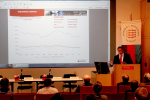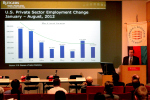NEW BRUNSWICK, NJ — On Thursday evening, September 27, a panel of industry experts each expressed cautious optimism for a continued modest economic and real estate market and investment recovery at the “Real Estate Development & Economic Summit” sponsored by Rutgers University’s Edward J. Bloustein School of Planning & Public Policy.
Dr. James W. Hughes, dean of the Bloustein School, opened the discussion, noting that New Jersey and the nation have been moving forward since The Great Recession but steep employment deficits remain. “Slow growth is going to be the global norm,” said Hughes, remarking that the U.S. still needs to recapture 4.2 million private sector jobs to return to the employment levels of December 2007. “There are a number of uncertain global and national issues that overhang economic and real estate development, and depending which way these dominoes fall will help invent our future.”
Historically, said Hughes, deep financial crises and debt-driven bubbles have been followed by long and weak recovery periods resulting in a broad scale of remaining uncertainty. Having just gone through the worst financial crisis and debt-driven bubble since the Great Depression, Hughes believes that many corporations and businesses will remain cautious, which will extend to their hiring and real estate plans.

Professor Joseph Seneca explained that the slow rate of growth will have profound implications for the state’s tax revenues.
New Jersey’s economic outlook was presented by Dr. Joseph J. Seneca, University Professor at the Bloustein School. He explained that whether measured by output, income, or employment, all factors tell the same story—New Jersey’s economy is growing slowly, and the slow rate of growth will have profound implications for the state’s tax revenues.
New Jersey lost 248,000 (7.2 percent) private sector jobs during The Great Recession (January 2008–February 2010) according to data from the New Jersey Department of Labor. Seneca further noted that the state has regained only 34.7 percent, or approximately 86,000, private sector jobs since February 2010, ranking it 34th among the states and well below the overall national recovery rate of 52.1 percent.
“This has been the lost decade-plus in employment—we are at the same level of private sector employment as 13 years ago,” said Seneca. “We need to create 162,000 private sector jobs in order to return to the January 2008 peak of 3,445,800 total jobs.” Based on the job growth rate calculated from the data through August 2012, he estimated that it could take 3.2 years to reach that peak number if the state adds 50,000 jobs per year. If only 25,000 private sector jobs are added per year, he went on, it would take almost 7 years.

Gil Medina explained that between 1990 and 2011 the state saw a dramatic shift in the economic base, moving from a manufacturing to a service economy.
In discussing the outlook for New Jersey’s commercial and industrial real estate markets,Gualberto “Gil” Medina, executive managing director of Cushman & Wakefield, explained that between 1990 and 2011 the state saw a dramatic shift in the economic base. The state has moved toward a service economy, he explained; while government jobs remain the state’s leading employer the manufacturing industry, previously a close second, has trended downward as education and healthcare positions have risen significantly.
“U.S. cities that have had the strongest job recoveries are those that have an economic base with a significant number of energy-related or technology-related industries. A service economy recovers in a much different fashion than a manufacturing economy,” said Medina. “These shifts also have implications for the real estate markets. New Jersey has the fourth largest office market in the United States. Office leasing activity dropped significantly in the beginning of the century—what Dr. Seneca called the “lost” decade—and has remained relatively low ever since. Absorption—how much real estate is being occupied—is an important measure of the state of the economy.”

Investors are looking for hard assets such as real estate, said Jose Cruz, because they want to buy safety.
Jose Cruz, Senior Managing Director for Holliday Fenoglio Fowler, LP, followed with a look at commercial real estate investment trends. Transaction volume has increased substantially, he explained, because investors are looking for hard assets. “A lot of these investment companies, a lot of these pension funds, a lot of the foreign owners are saying, I want to invest in real estate. I want to buy safety. Or, I want to buy a value-add opportunity where I can make money,” he said.
He added that investment sales activity has been below peak levels but is increasing. Currently the rental market is very strong in New Jersey, as both vacancies and borrowing costs are low. Multi-family housing, industrial, and retail spaces are moving very well, especially large, stable, well-leased centers where investors do not have to take much leasing risk. Transit-oriented locations remain highly desirable, as do Hudson Waterfront complexes. “The increase in sales of these properties is pushing vacancy rates in the right direction while also seeing the return of rent growth for the first time since 2008.”




